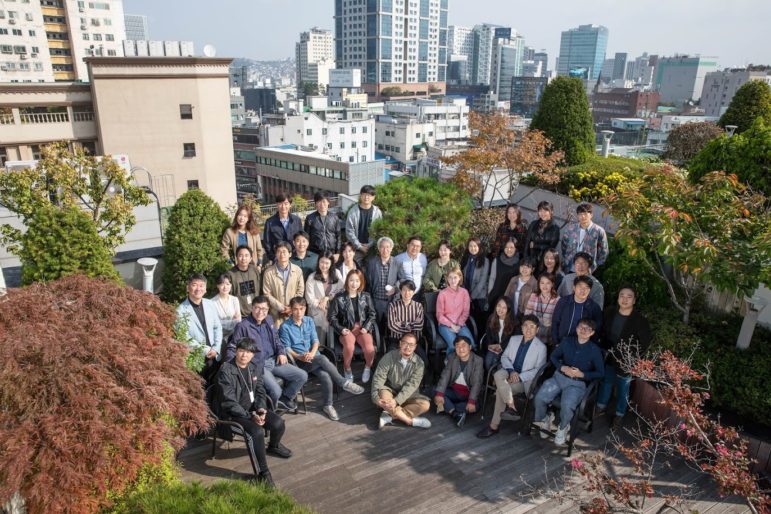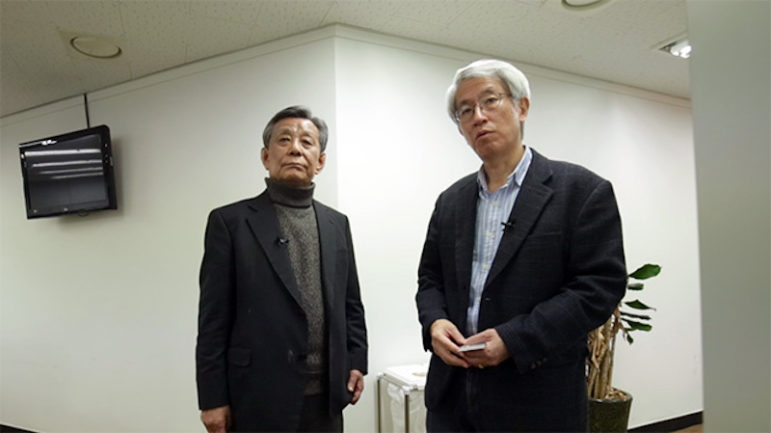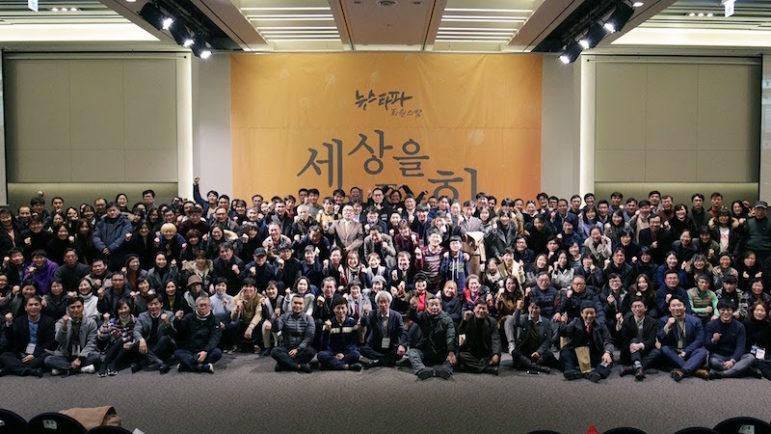
KCIJ-Newstapa’s staff. Photo: Courtesy KCIJ-Newstapa
Editor’s Note: The Global Investigative Journalism Network has 182 member organizations in 77 countries. Many work on the front lines of independent media and innovative journalism. In this series, we look at the extraordinary work they’re doing and the formidable challenges they face, from financial survival to attacks on press freedom. This week we profile South Korea’s KCIJ-Newstapa, which co-hosted with GIJN the groundbreaking third Asian Investigative Journalism Conference in 2018.
The South Korean nonprofit investigative newsroom Newstapa was born from frustration with the country’s media landscape. In January 2012, it was founded by a group of journalists who had been either dismissed or marginalized in their newsrooms for demanding editorial independence.
“Newstapa” can be translated into “breaking away from conventional news,” with tapa meaning “defying conventions” in Korean.
Though it has grown into a media organization with 50 employees, including 35 editorial staff, Newstapa didn’t have a funding model, nor a plan to establish a sustainable one, when it started. Today, the investigative newsroom is unique in its blend of broadcasting, documentary-making, and membership, breaking traditions and taboos in South Korea’s conservative media environment and serving as a model for nonprofit media around the world.
Its first episode — on changes in polling station locations ahead of a by-election — attracted over 300,000 views on YouTube.
“We only planned to run it for about a year,” said Kim Yong-jin, co-founder and editor-in-chief of what is today called KCIJ-Newstapa (where KCIJ stands for the Korea Center for Investigative Journalism).
Kim was still with the national public broadcaster KBS when he first joined Newstapa as an advisory member and came to Seoul on weekends to work as a desk editor. He had been transferred to Ulsan, a five hours’ drive from Seoul, after being demoted from his position as the head of KBS’s investigative reporting unit for protesting against the network’s self-censorship.
The National Union of Media Workers provided a workspace – a meeting room that Newstapa members could use when unoccupied – and around 20 million won ($16,830) to cover travel expenses and other minor costs for six months.
Newstapa didn’t even have a camera, so it had to rely on a small HD camcorder it borrowed from a math instructor. However, the response to its web TV show was phenomenal.
Its first episode — on changes in polling station locations ahead of a by-election — attracted over 300,000 views on YouTube.
“We also benefited from digital technologies that allow us to create and distribute content without big initial investment,” Kim said, noting that Newstapa reporters didn’t encounter much difficulty in gaining access, as many of them were veteran journalists.

Kim Yong-jin (right), editor-in-chief of KCIJ-Newstapa, poses with Kim Jung-bae, head of the organization’s advisory board. Photo: Courtesy KCIJ-Newstapa
Currently, Newstapa has some 390,000 YouTube subscribers, 609,000 Twitter followers, and 208,000 Facebook followers. Moreover, it has produced three documentary films that have attracted half a million viewers to movie theaters.
Establishing a Funding Model
In July 2012, Newstapa started accepting donations. In just a few days, it secured about 1,000 donors (both one-time and recurring). The number of recurring donors exceeded 25,000 in December 2013 when Park Geun-hye, a daughter of military strongman Park Chung-hee, won the presidential election with the help of the right-wing media.
KBS reporter Kim Kyung-lae and other prominent journalists quit their jobs and joined Newstapa as the country’s press freedom showed no sign of improving.
Following Park’s inauguration in February 2013, Newstapa appointed Kim as its new chief and renamed it as Newstapa, with the aim of turning it into a sustainable nonprofit, non-partisan investigative news outlet that doesn’t accept any corporate sponsorship or run advertising.
KBS reporter Kim Kyung-lae and other prominent journalists quit their jobs and joined Newstapa as the country’s press freedom showed no sign of improving.
“When the Lee Myung-bak administration took office in 2008, it became extremely difficult for us to report anything negative about the government,” said Kim Kyung-lae, who accepted a pay cut of about 10% when he moved to his new job in 2013.
The country’s press freedom was in serious jeopardy between 2008 and 2016 under the conservative administrations of Lee and Park, both of whom have been convicted of corruption and sentenced to prison. South Korea’s press freedom ranking by Reporters Without Borders plunged to 69 in 2009 under the Lee government, down from 31 in 2006. It slipped down another notch to 70 in 2016 during the Park government.
As defamation is punishable in South Korea by up to two years in prison even when published information is true, and by up to seven years when false information is disseminated, Newstapa launched a fund for the legal assistance of its journalists. It has set aside about 300 million won ($256,000 dollars).
Kim Yong-jin says Newstapa has been the target of 14 lawsuits and that it has won all of them except for one, where it was fined 3 million won (about $2,500) for publishing a phone conversation without the subject’s permission.
In-depth Investigations
Shortly after its renaming, Newstapa reported that the National Intelligence Service established a secretive cyber warfare unit that created more than 600 Twitter accounts and re-tweeted over 200,000 posts to attack opposition presidential candidates. Using a social web analysis tool, Newstapa found that at least 10 groups systematically operated on Twitter to manipulate public opinion in favor of presidential candidate Park Geun-hye.
Newstapa’s donor numbers rose by about 5,000 in 2013 after it published a series of reports about South Koreans who had shell companies in tax havens, in collaboration with the International Consortium of Investigative Journalists (ICIJ).
Its numbers rose by another 5,000 in the following year after its in-depth coverage of the Sewol ferry disaster, when the mainstream media erroneously reported all people on board had been rescued despite hundreds of passengers still trapped inside the vessel.
Newstapa has also often been a lone wolf in exposing wrongdoings of big advertisers, including Korean industrial giant Samsung.
It investigated the illnesses and deaths of Samsung employees who contracted leukemia and lymphoma after working at semiconductor plants. (The company initially denied any wrongdoing, then last year issued an apology and reached a settlement with its former employees.)
In 2016, Newstapa reported that the Samsung Group’s chairman had allegedly bought sex. This story attracted 13 million views on YouTube.
In 2018, Newstapa saw its donations drop by more than 10% as South Korea’s spot in Reporters Without Borders’ press freedom index improved to 43, up 20 places compared to the previous year.
In 2017, the number of donors surpassed 40,000 and its yearly donations exceeded 5.9 billion won ($5 million) when the Constitutional Court removed President Park from office over a graft scandal.
The Donations Challenge
The number of donors then began to decline as the country’s press freedom improved under the liberal Moon Jae-in administration and as mainstream media started to cover taboo topics that until then only Newstapa had covered. In 2018, Newstapa saw its donations drop by more than 10% as South Korea’s spot in Reporters Without Borders’ press freedom index improved to 43, up 20 places compared to the previous year.
Professor Kim Sung-hae, who serves as the head of journalism research at the Korean Society for Journalism and Communication Studies, says Newstapa is now facing a challenge in acting as a watchdog of the current administration, as most of its donors are liberals and supporters of human rights lawyer-turned-president Moon Jae-in.
“Its success in the past can hamper it from pursuing impartial journalism,” says Kim Sung-hae.
The number of Newstapa’s donors plunged when it ran pieces that portrayed certain liberal politicians in a negative light, including police whistleblower-turned-lawmaker Kwon Eun-hee. KCIJ reported that she had under-reported her and her husband’s assets by taking advantage of a legal loophole when running for office.
The number of its donors also fell significantly after it published a news report about a prosecutor-general nominee’s alleged lie over an influential peddling scandal during his confirmation hearing in July this year. The nominee was a heroic figure among liberals as he led an investigation into corruption of the previous conservative Park government.
Nonetheless, Kim Yong-jin says Newstapa will adhere to its mission statement of impartially exposing abuses of power and that he is confident that the number of recurrent donors will remain above 30,000. (There are currently about 31,000.)
Cross-platform Collaboration
With the change of government and the reinstatement of many of the laid-off journalists with former employers, cross-platform collaboration has now become a main focus for Newstapa.
In November 2018, Newstapa signed an MOU with 24-hour news channel YTN — where three ex-Newstapa members had been reinstated — on content exchange and collaboration.
Since May 2018, Kim Kyung-lae has hosted a current-affairs radio program at KBS, where one of Newstapa’s founding members was reinstated last year. Kim shares half of his extra earnings at KBS with Newstapa.
Newstapa also collaborated last year on a cross-border investigation led by German network NDR into a pseudo-academic society, along with the broadcaster MBC, where former Newstapa member Choi Seung-ho now serves as CEO. Newstapa’s reporter Kim Ji-yoon presented the story on both Newstapa and MBC.
In October 2018, Newstapa collaborated with journalists from media startup Sherlock, then verging on bankruptcy and without an office, to expose IT entrepreneur Yang Jin-ho’s beating of an employee and his forcing employees to shoot a live chicken with a crossbow. Newstapa provided workspace for Sherlock’s reporters, organized a news conference, and distributed the story on its online news platform.
In November 2018, Newstapa signed a memorandum of understanding with the 24-hour news channel YTN — where three former Newstapa members had been reinstated — on content exchange and future collaboration.

Newstapa-KCIJ journalists and donors celebrate the 2018 Members’ Night at a hall of Yonsei University in Seoul on Dec 19, 2018. Newstapa holds this event every year. Photo: Courtesy Newstapa-KCIJ
Building a Home for Journalists
Newstapa reached another milestone in August this year by launching Together Center, a co-working space for independent journalists, through a crowdfunding campaign that raised over 270 million won (more than $230,000). The Together Center has a multi-purpose TV studio, three editing suits, and two meeting rooms.
Two university teams, which were awarded 3 million won (about $2,500) each from Newstapa for pitching stories about university dormitory fees and right-wing extremists on campuses, became one of the first beneficiaries of the co-working space, where Newstapa staff will provide them with mentoring.
Independent documentary filmmaker Nam Tae-je is also using Together Center to edit his documentary about people living near a nuclear reactor in Wolseong. The film is expected to hit the big screen in November, with the support of Newstapa.
Newstapa has collaborated with independent producers and filmmakers since 2015 and has awarded 10 million won ($8,500) to documentary projects through public contests since 2018.
It has also run a popular online data journalism course since 2016 as a part of efforts to nurture future investigative journalists.
Kim Yong-jin says a key to making Newstapa sustainable will be earning the trust of its audience by demonstrating the values of unbiased news reports, and through collaboration and sharing of its resources with others.
“You should to prove yourself to be worthy before asking for help,” Kim said.